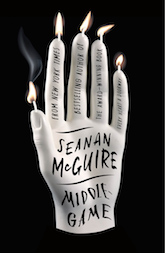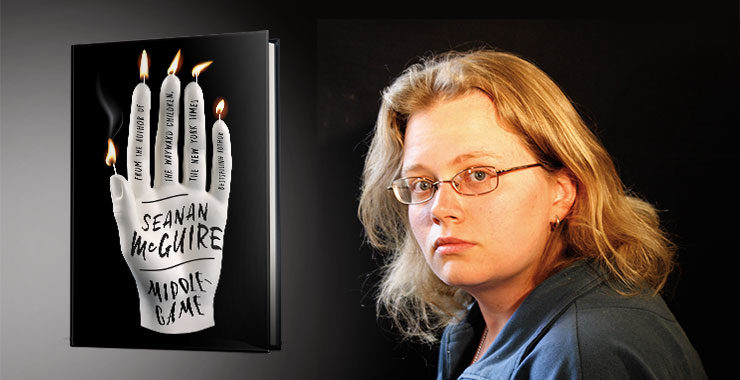Meet Roger. Skilled with words, languages come easily to him. He instinctively understands how the world works through the power of story. Meet Dodger, his twin. Numbers are her world, her obsession, her everything. All she understands, she does so through the power of math. Roger and Dodger aren’t exactly human, though they don’t realise it. They aren’t exactly gods, either. Not entirely. Not yet.
Meet Reed, skilled in the alchemical arts like his progenitor before him. Reed created Dodger and her brother. He’s not their father. Not quite. But he has a plan: to raise the twins to the highest power, to ascend with them and claim their authority as his own.
Godhood is attainable. Pray it isn’t attained.
Author Seanan McGuire introduces readers to a world of amoral alchemy, shadowy organizations, and impossible cities in the standalone fantasy, Middlegame, out from Tor.com Publishing on May 7th. Read Part Five below, or head back to the beginning with Part One!
The Impossible City
TIMELINE: 10:22 CST, JULY 3, 1986.
Reed hasn’t felt this good in years.
Leigh is safely back at the compound, up to her elbows in small-minded fools who can, hopefully, be more use in death than they were in life; the three sets of cuckoos have been split up and whisked away to their new homes, to be raised by ordinary people in an ordinary world.
(The fact that three of those supposedly “ordinary” families belong to him, body and soul, is irrelevant. They are failed alchemists all, scholars who had the desire but not the skill to serve him more directly. They will play at being lovers—perhaps some of them will actually fall in love—and they will raise his experiments with dedication and care. They are scientists. They have been given a project to complete. Failure is not an option; it would result in their bodies being given over to Leigh’s tender mercies, and no one who has met the woman would ever take such a risk. They are almost there. The Impossible City will be his.)
The car stops. Reed adjusts the collar of his shirt before he opens the door. Gone are the jewel tones and eye-catching runes, replaced by proper funereal black and a high-buttoned shirt that lends an almost parochial tone to his appearance. The Congress is not susceptible to the same showman’s tricks as his erstwhile investors. They must be handled with a more… delicate hand.
(Asphodel at the end: Asphodel the phoenix, on the verge of bursting into flames from the sheer force of her frustration. “They’re so sure they know what’s possible that they’ve limited themselves,” she snarls, and he could listen to her rage forever, could help her tear down the foundations of the world if that’s what she wants. She is his only love and his only superior and his only regret, for they both know what comes next in the story of their lives. They both know he’ll have to be the one to hold the knife.)
As he expected, they are waiting for him when he steps into the hall, his heels echoing in the stagnant air. The locals think this is a church, although none of them can name the denomination or remember anyone who comes to services here. Still, the shape of it is right, and when they drive by on a Sunday morning, there are always people standing on the green, dressed in modest suits, in sensible gowns. What else could it be?
Buy the Book


Middlegame
Sometimes the easiest trick is hiding something in plain sight. That which can be found without looking can’t possibly be dangerous, after all.
Reed regards the four men in front of him with a smile on his lips and murder in his heart. “I see you heard my news,” he says. “I thought I was coming to inform Master Daniels of something that might surprise him. Where is he?”
“Master Daniels has better uses for his time than consorting with the likes of you,” says one of the men, a pale whisper of a thing with barely visible eyebrows.
“I am a member of the Congress, am I not?” Reed continues to smile, and wonders whether the lack of facial hair is natural or the result of a laboratory accident. In either case, it could be resolved with simple cosmetics, and then the issue of the man’s faintly alien appearance would be resolved. “I have as much of a right to appear before our principal as any of you.”
“You tread dangerous ground,” says the next man, stout and solid in his charcoal suit, his businessman’s pose. “The Doctrine is not to be interfered with. Did the death of your master teach you nothing?”
Reed’s smile doesn’t flicker. “You have no right to speak of her, whose heart you broke, whose work you disdained yet do not shy away from using to your own advantage. Or have you retained your boyish figure through some mechanism other than her elixir of life?”
The man’s cheeks redden; he turns his face away. Reed steps forward.
“I will speak with Master Daniels. I will inform him that I have embodied the Doctrine, and give this Congress one more chance to grant me the position and power my accomplishments deserve. If I am refused, I will be quit of you, and my eventual command of this world’s defining forces will be your downfall. Do I make myself clear?”
“As always, you are nothing if not clear, James.”
Reed turns.
Master Daniels was old when Asphodel Baker was young: all her accomplishments, while they have prolonged his life, have not been enough to turn back time. He is old now, old beyond measure, and he walks into the vestry of the church that is not a church with the ponderous slowness of a man whose hurrying days are far behind him. Unlike the others in their sensible suits, he wears the red robes of his office, timeless and antiquated in the same moment.
If there is anyone in the Congress who understands showmanship as Asphodel did, it is Arthur Daniels. Reed’s smile as he beholds the man is genuine. They may stand on opposing sides of a divide, but at least Daniels stands with style.
(Asphodel at the end: Asphodel the penitent, begging her own master to understand what she has been trying to accomplish all the days of her life, head bowed, hands clenched against the ground. Asphodel, her eyes full of tears, pleading with the old fool to listen to her, to see past her woman’s form and her youthful face and hear her, for what is alchemy if not the use of all the myriad pieces of creation to forge a better whole? Refusing women their place in the upper reaches of the Congress only limits them, only lessens what they can do. And Daniels, the old fool, turns away.)
“Is it true, then?” he asks, taking a careful step toward Reed. “Have you done it?”
“The Doctrine lives,” Reed says. “It walks among us, prisoned in flesh, malleable, young, and foolish. I’ll have my day. As your ally or as your enemy, I’ll have it.”
“Do you believe you can control it? A force great enough to remake time?”
“I believe I already have.” The astrolabe, spinning, rewinding—oh, yes. He will control it.
The universe is his to command.
Daniels looks at him for a long, silent moment before inclining his head in acknowledgment. “Then it seems we must welcome you home, alchemist, for you have so much to teach us.”
The other men look alarmed, unable to believe this is happening. Reed smiles, walking quickly across the vestry to kneel before the older alchemist. When Daniels’s hand caresses his hair, it is like being touched by the fingers of a mummy: papery, ancient, and scented with the votive oils of the tomb.
“Believe in our works, and we will guide you to the light,” says Daniels.
(Asphodel at the end, bleeding her life out on the floor, a look of strange contentment on her face, like she always knew this would be the end of her; like she has been waiting. Like somehow, by losing, she’s won. He rages at that expression, but it’s too late. She’s gone, she’s gone, and if this was her victory, she’s carried it with her to the grave.)
“And the light shall guide me home,” says Reed.
He is triumphant in his defeat.
By the time they realize why, he knows, it will be too late, and Asphodel, who would never have been forced to create him, her killer, if not for the small-minded fools who now surround him, will be avenged.
All he has to do is wait, and his cuckoos will spread their wings, and the universe will be his.
Excerpted from Middlegame, copyright © 2019 by Seanan McGuire.










